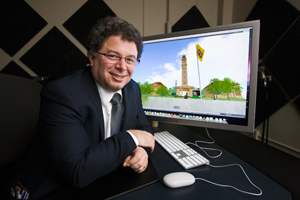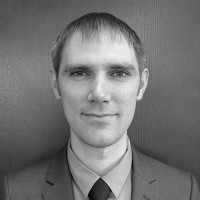
Stephen David Beck
Derryl & Helen Haymon Professor of Music
Associate Vice President, Office of Research & Economic Development
Stephen David Beck is the Haymon Professor of Composition and Computer Music in the School of Music as well as the Associate Vice President for Research Security & Safety at the Office of Research & Economic Development. He holds a joint appointment at the Center for Computation & Technology, where he previously served as the Area Head for the Cultural Computing focus area and Director of the AVATAR Initiative in Digital Media. He was also Interim Director of the center from 2008-2010, and Director of the School of Music from 2012-2015.
Dr. Beck received his Ph.D. in music composition and theory from the University of California, Los Angeles, in 1988, and held a Fulbright Fellowship in 1985-86 where he was a researcher at the Institut de Recherche et Coordination Acoustique/Musique (IRCAM) in Paris, France. His current research includes sound diffusion systems, high-performance computing applications in music, and virtual music instruments, a system of interactive computer programs that extend and expand on the performance capabilities of acoustic instruments.
His music has been performed throughout the world, including performances at Weill Recital Hall, Sao Paolo Bienal ’91, SCREAM Radio Series, Concert Band Directors National Association Biennial, North American Saxophone Alliance, New Music America, World Harp Congress, and on the Triforium Series in Los Angeles. His music and writings have been published by G. Shirmer, MIT Press, and the Computer Music Journal, and his music has been recorded on the SEAMUS, EMF and Gothic record lables.
Dr. Beck has also presented lectures and papers on his research in interactive computer music and high-performance computing applications in the arts at recent meetings of the International Computer Music Conference, the Global Grid Forum, the Teaching in Higher Education (THE) Forum, the Society for Electro-Acoustic Music in the United States (SEAMUS), and the Society of Composers, Inc. He currently serves as Music Coordinator and Regional Director (Americas) of the International Computer Music Association. He also served on the board of officers of SEAMUS, most recently as President (1996-2000).
About his music, Beck writes:
“…the use of technology in my music is not meant to replace musicians, but rather to enhance and expand a performer’s potential for expressiveness, technique and, most importantly, timbre. There is an uncanny beauty in the physical and mathematical laws of nature, a beauty of intense complexity bond by simplicity, order and logic. For me, this is a constant and powerful source of inspiration, and the use of modern technology seems the perfect tool for expressing that inspiration and awe.”
Associate Professor of Experimental Music & Digital Media – LSU School of Music
Cultural Computing – LSU Center for Computation & Technology
Associate Director of the LSU STEM Pathway in Digital Design & Emergent Media – LSU Cain Center
Jesse Allison is a leader in sonic art technology, thought, and practice. Dr. Allison holds the position of Assistant Professor of Experiment Music & Digital Media at Louisiana State University. As part of the Cultural Computing focus of the Center for Computation & Technology, he performs research into ways that technology can expand what is possible in the sonic arts. Prior to coming to LSU, he helped to found the Institute for Digital Intermedia Art at Ball State University and Electrotap, an innovative media arts firm.
Research and invention interests include computer interactivity in performance, distributed music systems, mobile music, interactive sonic art installations, hybrid worlds, and multi-modal artworks, those that can be experienced through a variety of means. As such, he manages the Media Interaction Laboratory and Library (MILL), co-directs the Laptop Orchestra of Louisiana (LOLs), and heads up the Mobile [ App | Art | Action ] Group (MAG) for the CCT.As an artist, Allison has disseminated his work around the globe through live performance art, interactive installations, virtual and hybrid worlds interventions, and presentations. Recent performances/exhibits include the Pixilerations Festival, New Instruments for Musical Expression (NIME), Siggraph, Techfest Bombay, International Computer Music Conference (ICMC), the IUPUI Intermedia Festival, Boston Cyberarts Festival, and the Society for Electro Acoustic Music in the United States. Allison received his doctor of musical arts in composition from the University of Missouri — Kansas City.
Assistant Professor of Experimental Music & Digital Media – LSU School of Music
Born and raised in New Orleans, where he graduated from NOCCA and Benjamin Franklin high school, Trapani holds a bachelor’s degree from Harvard College, where he studied composition with Bernard Rands and poetry under Helen Vendler. He spent most of his twenties overseas: a year in London, working on a master’s degree at the Royal College of Music with Julian Anderson; a year in Istanbul, studying microtonality in Ottoman music on a Fulbright grant; and seven years in Paris, where he studied with Philippe Leroux and worked at IRCAM. Since 2010, Christopher has been based primarily in New York City, where he completed a doctorate at Columbia University in 2017, studying with Tristan Murail, Georg Friedrich Haas, Fred Lerdahl, and George Lewis.During the 2021-22 academic year, Trapani served as Visiting Assistant Professor of Composition at the University of Southern California in Los Angeles. He also holds Italian citizenship, and maintains a European base in Palermo, Sicily.
Trapani is a former winner of the Rome Prize (2016-2017), as well as the 2007 Gaudeamus Prize—the first American in over 30 years to win the international young composersaward. Trapani was also a 2019 fellow of the John Simon Guggenheim Memorial Foundation, and the winner of the 2020 Barlow Prize. Other honors include a Charles Ives Scholarship from the American Academy of Arts and Letters (2015), the Julius F. Ježek Prize (2013), three Morton Gould Young Composers Awards from ASCAP (2005, 2006, and the Leo Kaplan Award in 2009), and a BMI Student Composer Award (2006). His work can be heard on two portrait CDs on New Focus Recordings, Waterlines (2018) and Horizontal Drift (2022).
Recent commissions have come from the Fromm Foundation (2019), the Koussevitsky Foundation (2018), as well as the BBC, Ensemble Modern, and Radio France. His works have been heard at Carnegie Hall, the Venice Biennale, Southbank Centre, Ruhrtriennale, IRCAM, Ravenna Festival, and Wigmore Hall
As a composer, Trapani is known for synthesizing disparate influences, weaving American and European stylistic strands into a personal aesthetic that defies easy classification. Allusions to Delta Blues, Appalachian folk tunes, dance band foxtrots, shoegaze guitar effects, and Turkish makam can be heard alongside spectral swells and meandering canons. As in Trapani’s hometown of New Orleans, diverse traditions coexist and intermingle, swirled into a rich melting pot.
Faculty Emeritus
2013-2022 – Associate Professor of Experimental Music and Digital Media, CCT
Dr. Berdahl received his PhD at the Center for Computer Research in Music and Acoustics (CCRMA), Stanford University, where he later worked as a lecturer. Dr. Berdahl has also been a Humboldt Postdoctoral Fellow at the Technical University of Berlin, and he has studied at the Center for New Media and Art Technologies (CNMAT) at UC Berkeley and at ACROE at the Grenoble Institute of Technology in France. Besides teaching workshops at international conferences, he has many publications, including journal papers in the Computer Music Journal, Organised Sound, the Journal of the Acoustical Society of America, and the IEEE Transactions on Haptics. At Stanford University, Dr. Berdahl taught the first class in which music students rapidly prototyped embedded musical instruments with high-quality sound.



